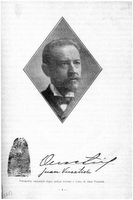 The year is 1892. The place Necochea, Argentina. Francesca Rojas' two young children (ages 4 and 6) are found beaten with their throats cut in their home. Rojas claims that she saw a man named Velasquez leaving her house as she returned from a store. She had earlier in the day been threatened by Mr. Velasquez after rejecting his sexual advances. (Some sources claim that she had an injury to her own neck. No one knows if it was earlier in the day or if she were somehow present at the house.)
The year is 1892. The place Necochea, Argentina. Francesca Rojas' two young children (ages 4 and 6) are found beaten with their throats cut in their home. Rojas claims that she saw a man named Velasquez leaving her house as she returned from a store. She had earlier in the day been threatened by Mr. Velasquez after rejecting his sexual advances. (Some sources claim that she had an injury to her own neck. No one knows if it was earlier in the day or if she were somehow present at the house.)Velasquez is picked up by the Argentinean police and "questioned." Questioning in Argentina in the 1800's consisted mainly of beating, cutting, and general torture techniques that would make Rumsfield blush. One method used for Mr. Velasquez was tying him to the corpses of the children for an evening. When that did not work the torture resumed as planned. After two weeks and no confession the police were, uh, stymied. Usually, anyone would confess to just about anything under these circumstances.
At about the same time Juan Vucetich (picture right - click to enlarge) of the provincial police in Buenos Aires was tasked with setting up a "Bertillonage System" which involves photographing a suspect in over 200 locations of his body for identification. This was very expensive in 1892. He was looking for a cheaper way to do it.
Inspector Vucetich was sent to the house to look into the grisly murders. He discovered a bloody fingerprint on a door frame. With a saw he cut the print out of the frame and brought it back to the police station. Somehow during his "interrogation" Velasquez was no longer able to give an "accurate" thumbprint to the inspectors. Vucetich, being a wise detective, opted to remove the other "suspects" from the scene of the crime. He first fingerprinted Ms. Rojas with ink (first time this was done for forensic purposes) and the story ends.
Shortly after matching the fingerprints Ms. Rojas admitted to killing her two children to improve her chances of marrying her boyfriend who disliked children. She was sentenced to life imprisonment. Nothing else is known about poor Velasquez. Argentina became the first country to replace anthropometry with fingerprinting. So if you are involved with arms dealing, money laundering, narcotics trafficking, or attempting to forcibly reclaim the Falkland Islands, do so with gloves on.

No comments:
Post a Comment